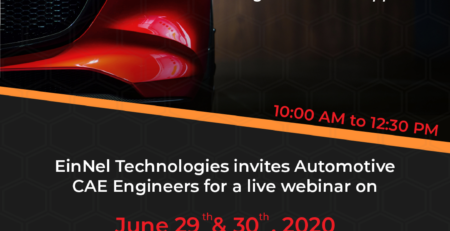Hydrogen Combustion Modeling and Research: Providing Solutions for Complex Engineering Problems
Mr.Nagendrakumar – Director, Engineering
In today’s dynamic landscape, Internal Combustion (IC) engines serve as integral components, propelling various modes of transportation and machinery. Yet, they raise environmental and resource scarcity concerns due to their use of fossil fuels. Hydrogen Powered Vehicles (HPVs) and Battery Electric Vehicles (BEVs) emerge as alternatives, with BEVs offering emission reduction but facing range and charging limitations. Hydrogen stands out for its clean combustion, high energy density, and quick refueling, addressing concerns about emissions and convenience. Yet, challenges such as infrastructure development, production efficiency, and safety hinder widespread adoption of hydrogen-powered vehicles.
The Role of Hydrogen Combustion Systems in Vehicle Innovation
The development and optimization of hydrogen combustion systems are crucial steps towards realizing the full potential of hydrogen-powered vehicles. To address these, automotive OEMs are turning to virtual simulations and AI/ML technologies.
Virtual simulations are pivotal in advancing hydrogen combustion systems, offering engineers the ability to create digital models for in-depth analysis. By accurately simulating combustion behavior, factors like fuel injection timing, combustion chamber design, and exhaust gas recirculation can be optimized to enhance efficiency and optimize the design.
A key component of virtual simulations is Computational Fluid Dynamics (CFD), which visualizes and analyses complex flow patterns, temperature distributions, and chemical reactions within the combustion chamber. This data aids in designing more efficient engine configurations and refining combustion processes. Moreover, virtual simulations facilitate rapid iteration and optimization, enabling engineers to swiftly modify parameters and assess their impact on performance. This expedites development cycles and reduces time-to-market for hydrogen-powered vehicles.
However, the complexity of Hydrogen Combustion Simulations demands a high level of expertise in specialized areas such as Species Transport, Radiation, High-Speed Flow Modeling, and others. Mastery of these intricacies is essential for accurately capturing and predicting the behavior of hydrogen combustion systems.
AI/ML technologies complement virtual simulations by leveraging data analytics and machine learning algorithms to further optimize combustion processes. They analyze large datasets to identify patterns, correlations, and optimal operating conditions. Optimization algorithms continuously refine combustion parameters using techniques like genetic algorithms, neural networks, and reinforcement learning. This iterative process further enhances combustion performance based on feedback from virtual simulations and real-world testing.
EinNel stands at the forefront of innovation, boasting expertise in Data-driven CAE using all the AI/ML techniques, especially in the Hydrogen combustion simulations. With a proven track record of competency and experience in these cutting-edge technologies, we are well-equipped to address the complex challenges of optimizing designs for hydrogen-powered vehicles.
At the heart of our capabilities lies the MDOX platform, a powerful tool based on AI/ML techniques. This platform revolutionizes vehicle design by offering a data-driven approach to optimization. Through features such as Sensitivity Analysis, Multi-Objective & Multi-Disciplinary optimization, etc., the MDOX platform empowers engineers to transform data into actionable insights. By leveraging the platform’s robust big data management system, we elevate simulation-based engineering into objective-driven engineering, enabling our clients to make informed decisions and achieve unparalleled efficiency in their design processes.
The advancement of hydrogen combustion modeling and research holds the key to solving complex engineering problems in the transportation industry. By embracing hydrogen-powered vehicles and leveraging cutting-edge technologies such as virtual simulations and AI/ML, we can pave the way for a cleaner, more sustainable future. EinNel is committed to driving this innovation forward, providing solutions that optimize performance, efficiency, and environmental impact in the realm of vehicle design and engineering.








